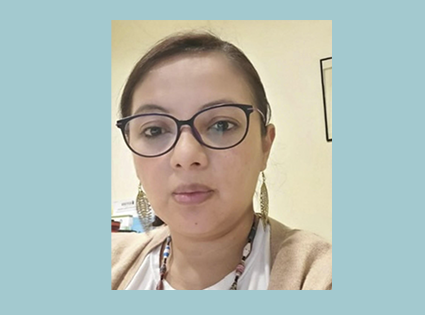Erika Arcentales Espinosa
Erika Arcentales is a community activist at heart. She has shown her passion for helping the Latino community through each organization she has worked for. It is not uncommon to find her at community events where she personally ensures that the Latinos present are not left behind, insists that the organizations for which she works makes its services available in Spanish to those who are not English proficient ensuring they are served, and insists that knowing the needs of Latinos is key to getting them ahead. We talked to her to get to know her better.
Where are you from andwhy did you come to Alaska? I was born and raised in Quito, the capital of Ecuador (right on the equator, the middle of the world), I arrived in Alaska in 2004 with my family. Family reunification is the reason we came to Alaska. My husband had lived here for several years and applied for us to come here. However, our case had a six-year separation process. My children and I lived in Ecuador and my husband visited us every year. During the time we lived through this dynamic, my children began to really feel the absence of their father. Every time he had to leave was very sad for them, especially for my daughter. So, I decided to write letters to the U.S. Consulate in Ecuador pleading my case, and although they responded, their response was a total surprise. The lawyer who was handling our case abandoned it without telling us. As soon as we knew this, we looked for another lawyer, and the waters returned to their course. We found a great immigration lawyer who took our case and after many years, we achieved a great family reunification. Alaska is now our home and has opened doors to several career growth opportunities. I have worked for 16 years for non-profit organizations and contributed to my community under each of these organizations in a positive way. Where do you work now, and how would you describe a typical day at work? I am currently working for the Anchorage School District (ASD) in the Child in Transition department. This department is responsible for working with children and their families who do not have an established home and are in a very difficult situation. My job receives cases from families who are going through this unfortunate and vulnerable situation. We receive referrals from different agencies or people who have knowledge of these children and their families, such as school principals, teachers, nurses, clinics, hospitals, social programs such as Head Start, shelters, or any other agency that knows that these children and youth need help. Another task we have is to help them connect with the right people and agencies, whether health or education, and to help make their burden a bit lighter during this transition or situation. We try to encourage parents to register their children in schools, we help them with transportation, food information, we provide school supplies, clothing, and whatever the family needs if it is within our reach. Were you surprised to find Latinos in Alaska? Nineteen years ago, Alaska did not have a large population of Latinos, but in recent years our community has grown a lot, and I like that because it makes me feel at home. I think what surprised me the most is that the people of Alaska welcome Latinos in a positive way and enjoys learning about our culture and language. What do you do when you’re not working? I enjoy connecting and sharing with my Latino community. One of my great passions is working very closely with my people to know their needs. I am part of the Peer Leader Navigators, I volunteer for the Medicare office as a Medicare Counselor, and I participate as part of the AK Heart and Diabetes Coalition group. Also seeing the needs of the community a few years ago I started a group of Latinos called “AK un Espacio para Latinos.” This group of 80 people, and that grows every day, allows us to share ideas and information from different agencies, activities, events, and even concerns that our community has. Without the trust of my community, it would not be possible to do so. Anything else you’d like to share with us? Our community in Alaska is growing rapidly, and so are its needs, so Latino leaders must take the time to listen, and use the different resources that exist for the good of the community. If we work together and support each other, we will have a stronger Latino community. |
